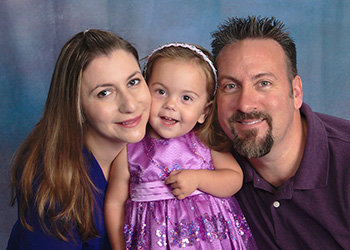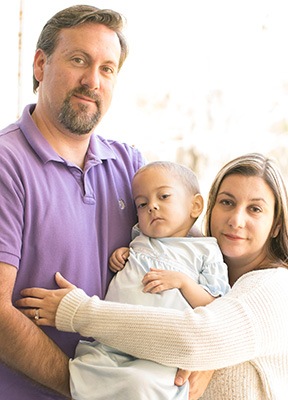2 Years Old at Diagnosis
Written by Bryan Begley
 Our sweet little girl Lillian “Lilly” Jewel Begley passed away on February 28, 2016 from her nine month battle with high-risk stage 4 neuroblastoma cancer. She was one month away from turning three years old. We did the best we could in treating her cancer with no regrets. Lilly’s main hospital was Wolfson Children’s Hospital in Jacksonville, FL. She also had treatments at UF Health Shands Children’s Hospital in Gainesville, FL, Memorial Sloan Kettering Cancer Center in New York City, and Children’s Healthcare of Atlanta – Egleston in Atlanta, Ga.
Our sweet little girl Lillian “Lilly” Jewel Begley passed away on February 28, 2016 from her nine month battle with high-risk stage 4 neuroblastoma cancer. She was one month away from turning three years old. We did the best we could in treating her cancer with no regrets. Lilly’s main hospital was Wolfson Children’s Hospital in Jacksonville, FL. She also had treatments at UF Health Shands Children’s Hospital in Gainesville, FL, Memorial Sloan Kettering Cancer Center in New York City, and Children’s Healthcare of Atlanta – Egleston in Atlanta, Ga.
Lilly was born and raised in the Jacksonville, FL area and was one of the sweetest, cutest, and most affectionate two year olds you’d ever meet. Her giggles were larger than life. Lilly’s short life touched many all around the world. With her illness we met new friends, including doctors, nurses, therapists and more. All of the people who helped care for our little angel were blessings to her and our family. Lilly felt love everyday on this earth. We can only imagine the love she feels in heaven now and with no pain. She is forever a part of us and those who followed her through her journey. Lilly leaves a legacy of kindness and caring for others in time of need.
Our Lilly was in perfect health for two years before showing signs of having a cold or virus at 25 months old. After one week of treating Lilly for a cold, our pediatrician said it must be a virus and to keep an eye on her. The week after that, Lilly stopped drinking and a trip to the ER for dehydration led to an X-ray showing an abdominal mass. After being admitted to the oncology floor, we heard the words “your child has cancer.” After several tests and a biopsy over the following week, we learned that Lilly had high-risk stage 4 neuroblastoma.
Q. What do you wish other parents knew about pediatric cancer?
A. Pediatric cancer can strike any child at any time. Often, pediatric cancers aren’t hereditarily or environmentally caused and they don’t discriminate. A child’s race, ethnicity or socioeconomic background spanning from newborns to teenagers are at risk every day. One day your perfectly healthy child can be enjoying life as usual, and the next they may end up in the pediatrician’s office or hospital ER being told they might have cancer.
Pediatric cancer will change everything normal in a child and their family’s lives. Pediatric cancer produces a physical, emotional, spiritual and financial exhaustion to parents. Most people don’t understand that one or both parents may have to quit or drastically cut hours from their jobs for months or years. This creates a snowball effect of bills not getting paid and running out of money to simply transport their child to the hospital or to maintain living expenses while at the hospital. Constantly researching and hoping for the best treatment for your child and taking care of your child with cancer is exhausting, physically and emotionally. Parents are often worried of becoming ill from the stress. If the parent becomes ill, they can’t be with their child while in the hospital.
Q. Why is pediatric research so important?
A. Cancer is the leading cause of death from disease among children in the United States. Pediatric cancer research is so important because our children are the future and they may be struck with cancer on any given day. Saving families from the horrors of childhood cancer must be considered an important issue. Children have their whole lives to live if they survive their cancer. Most children are treated with an adult cancer approach, which is very harsh on children’s bodies. This leads to many horrible short and long term effects that the child must live with forever. Children battling or surviving cancer often have to suffer reduced bodily functions, heart issues, infertility, hearing loss, loss of organs or limbs, and may suffer a secondary cancer. Research for not only newer, but safer treatments for childhood cancer are very important.
Q. What advice would you give to a parent/family member of someone with cancer?
 A. Here is some advice for unfortunate parents that have to experience childhood cancer.
A. Here is some advice for unfortunate parents that have to experience childhood cancer.
The number one rule is to deal with cancer one day at a time. There is no need to worry about two years down the road, two months or even two weeks. Cancer likes to change on a daily basis, sometimes hourly. Anything you plan will most like be disrupted by cancer, so take it one day at a time. Sure, have an idea of what may be coming up, but remain aware that it will change and you must remain flexible.
Rely on other people to help you. You will always be tired, but you will get used to that. When it comes to your child, you will always find the strength to carry on. You need to lean on family and friends to help you take care of your child with cancer or your other children and pets at home. Some friends and family will always ask to help and you should let them. Also, other friends and family may stop talking to you, assuming that you’re too busy or that they figure you will call them if needed. Although they aren’t pro-active in helping, they probably will if you ask them to.
Ask for the hospital social worker to talk with you about helpful organizations. There are many organizations willing to help logistically, financial, emotionally and spiritually and the social worker can help enroll you to obtain support.
The parent or a family/friend should set up a social media page and a donation page. This is a good way to keep family and friends updated on a regular basis and reduce the amount of time you spend texting or talking on the phone to one individual at a time over-and-over all day long. This also makes sure the correct information is being shared. Also, you will be amazed at how many strangers want to be involved with your child’s fight and are willing to help emotionally with comments and financially. Most of these strangers will be friends of friends and the others have most likely been touched by childhood cancer in the past and actually know what you’re going through.
Q. What advice would you give to a child battling cancer?
A. We’re not sure what to say about giving advice to at child battling cancer. Lilly was so young she believed that her time in the hospital was normal. The last few weeks of her life she started figuring out the concept of being “sick” and not all little kids are ill like her.
We suppose that we’d say to take it one day at a time and enjoy every day the best you can and love your family and friends.
The cure for childhood cancer is a big puzzle and every child with cancer is a unique puzzle piece. Eventually the puzzle will be complete with the help of organizations like CureSearch and the cure for childhood cancer will be solved.
Thank you for this opportunity to share,
Bryan (and Emily & Lilly too)
Lilly’s father Bryan is a computer graphics manager and her mother Emily is a family nurse practitioner currently specializing in dermatology. Emily previously worked over eight years as an oncology nurse treating adult cancer patients.
Want more stories like this?
Get emails that matter, when it matters.
